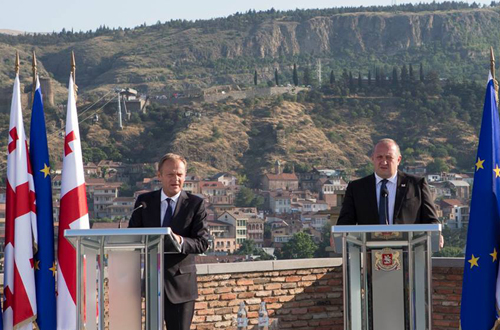
European Council President Donald Tusk (left) and Georgian President Giorgi Margvelashvili (right) at a joint news conference after the meeting in the presidential palace in Tbilisi, July 20, 2015. Photo: Georgian president’s office
European Council President, Donald Tusk, who started his visit to Tbilisi on Monday, praised Georgia as “definitely a front-runner” in EU’s Eastern Partnership program and condemned recent placement of demarcation signposts at the breakaway South Ossetia administrative boundary line as “provocation”.
Tusk, who is visiting Georgia as part of his trip to three South Caucasus countries, met President Giorgio Margvelashvili and parliament speaker Davit Usupashvili on July 20. He will meet PM Irakli Garibashvili and representatives of the opposition parties on July 21.
“Georgia has defined itself as a close associated partner of the EU and our bilateral relations are strong and growing. Georgia is definitely a front-runner in the Eastern Partnership. This is not flattery. It is a fact,” he said during a joint news conference with President Margvelashvili.
Tusk, who arrived in Tbilisi after talks in Armenia and will be visiting Azerbaijan on July 22, said that Georgia “really matters a lot to us.”
“Maybe Europe is not giving you everything you would like to get but it is nevertheless giving, especially when you compare Europe to others,” he said.
On visa liberalisation, Tusk reiterated EU’s official line that Georgia needs more efforts to meet all the criteria required to be granted short-term visa free stay in the Schengen area, but he also added his personal opinion saying that “Georgia in fact is really well prepared.”
Asked if it will be possible to grant Georgia visa waiver in 2016, Tusk responded that he personally has a “very strong political will” in favor of such decision.
“It of course is not a guarantee for success, but for sure I will be as supportive as possible when it comes to visa liberalisation,” he said, adding that both he and the European Commission President Jean-Claude Juncker are “personally committed to be as ambitious as possible” in this respect.
He said that “much progress has been made” in implementing reforms required for visa waiver.
“But for moving ahead [towards] the visa free regime some more reforms are needed,” Tusk said.
“Georgia needs to continue its hard work in implementing reforms in the areas of anti-corruption, migration, asylum, trafficking,” he said.
After listing these areas, identified by the European Commission’s May 2015 report, where more progress is needed, Tusk continued: “I know this is a formal position of our officials and I am fully aware that in fact Georgia is really well prepared.”
“In our ambitious timeline, I am absolutely sure, you will be successful,” Tusk said and reiterated earlier decision of the EU to speed up next report of the European Commission on how Georgia is implementing its Visa Liberalisation Action Plan (VLAP) and to release it before the end of this year.
He also said that the Association Agreement, which Georgia signed with the EU last year, “will play a crucial role in further deepening our cooperation.”
“We are ambitious because we want to make sure that positive changes will be seen and felt as early as possible by the Georgian society. One such example is giving Georgians visa-free travel to the EU,” Tusk said.
President Margvelashvili said that the Georgian government and parliament are “working actively” to meet the VLAP requirements.
Increase of trade, progress on visa-free travel & closer cooperation are all part & results of #EaP #AA/DCFTA pic.twitter.com/qMDrG0bCas
— Donald Tusk (@eucopresident) July 20, 2015
The European Council President said that “the difficult regional and international context” was also discussed during the meeting with Margvelashvili.
Tusk will be visiting administrative boundary line with breakaway South Ossetia on July 21, where new demarcation signposts have been installed recently by the Russian troops.
Tusk said that installation of these signposts is “a step in the wrong direction.”
“It is clearly a provocation and it does not assist to build trust in the ongoing efforts to stabilize the situation and to bring about longer term conflict resolution,” he said and reiterated EU’s support to Georgia’s territorial integrity saying that “Abkhazia and South Ossetia are integral parts of Georgia.”
President Margvelashvili said that timing of the European Council President’s visit was very important amid “difficult developments” along the administrative boundary line.
“Every new such signpost, which demonstrates historic injustice on our sovereign territory, and every new barbed wire is and will always be absolutely unacceptable; every such case is painful for us,” the Georgian President said.
“In this difficult situation it is extremely important to maintain our strategic course and to plan our coordinated response to these provocations and pressure cool-headedly without emotions,” Margvelashvili said. “First is to continue what we are doing now – from the highest European level we hear support towards Georgia’s territorial integrity and policy of non-recognition [of Abkhazia and South Ossetia]. Second – Georgia is not suspending its development, on the contrary it is becoming even more important player in the region, linking even more countries of Asia and Europe, and is becoming the country whose stability and development is important for players in Asia and Europe. And we are trying to consolidate public on issues like – keeping calm and resolving this situation calmly, with less political speculation on this issue.”
This post is also available in: ქართული (Georgian) Русский (Russian)
